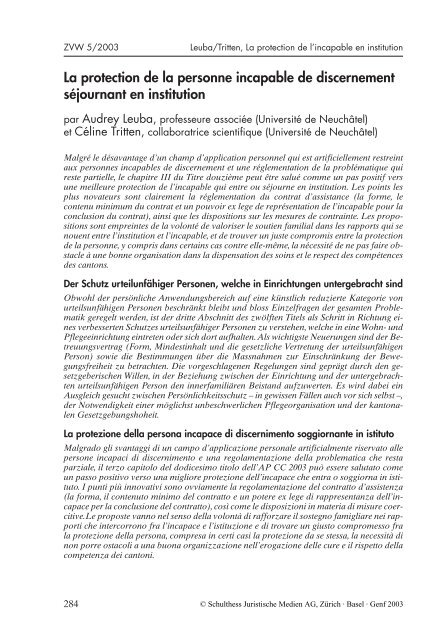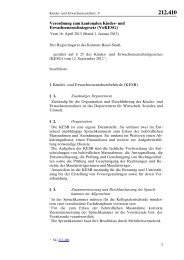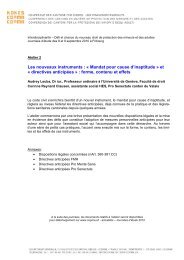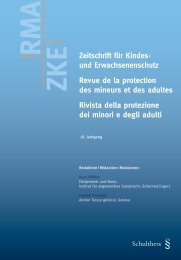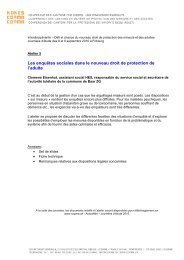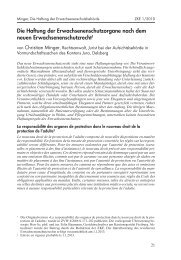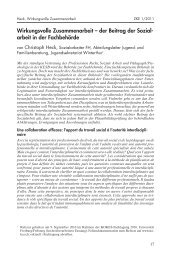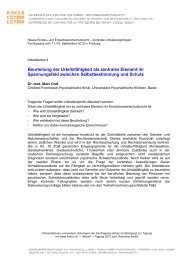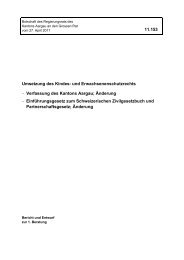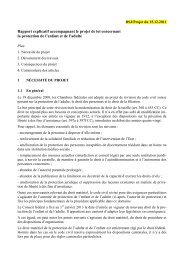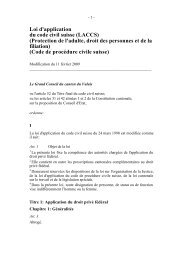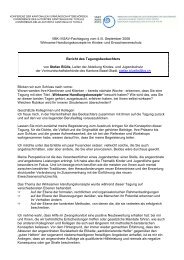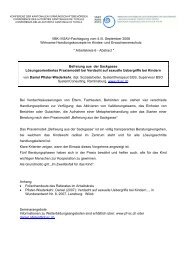RDT - Numéro spécial concernant la révision - VBK-CAT
RDT - Numéro spécial concernant la révision - VBK-CAT
RDT - Numéro spécial concernant la révision - VBK-CAT
Sie wollen auch ein ePaper? Erhöhen Sie die Reichweite Ihrer Titel.
YUMPU macht aus Druck-PDFs automatisch weboptimierte ePaper, die Google liebt.
ZVW 5/2003<br />
Leuba/Tritten, La protection de l’incapable en institution<br />
La protection de <strong>la</strong> personne incapable de discernement<br />
séjournant en institution<br />
par Audrey Leuba, professeure associée (Université de Neuchâtel)<br />
et Céline Tritten, col<strong>la</strong>boratrice scientifique (Université de Neuchâtel)<br />
Malgré le désavantage d’un champ d’application personnel qui est artificiellement restreint<br />
aux personnes incapables de discernement et une réglementation de <strong>la</strong> problématique qui<br />
reste partielle, le chapitre III du Titre douzième peut être salué comme un pas positif vers<br />
une meilleure protection de l’incapable qui entre ou séjourne en institution. Les points les<br />
plus novateurs sont c<strong>la</strong>irement <strong>la</strong> réglementation du contrat d’assistance (<strong>la</strong> forme, le<br />
contenu minimum du contrat et un pouvoir ex lege de représentation de l’incapable pour <strong>la</strong><br />
conclusion du contrat), ainsi que les dispositions sur les mesures de contrainte. Les propositions<br />
sont empreintes de <strong>la</strong> volonté de valoriser le soutien familial dans les rapports qui se<br />
nouent entre l’institution et l’incapable, et de trouver un juste compromis entre <strong>la</strong> protection<br />
de <strong>la</strong> personne, y compris dans certains cas contre elle-même, <strong>la</strong> nécessité de ne pas faire obstacle<br />
à une bonne organisation dans <strong>la</strong> dispensation des soins et le respect des compétences<br />
des cantons.<br />
Der Schutz urteilunfähiger Personen, welche in Einrichtungen untergebracht sind<br />
Obwohl der persönliche Anwendungsbereich auf eine künstlich reduzierte Kategorie von<br />
urteilsunfähigen Personen beschränkt bleibt und bloss Einzelfragen der gesamten Problematik<br />
geregelt werden, ist der dritte Abschnitt des zwölften Titels als Schritt in Richtung eines<br />
verbesserten Schutzes urteilsunfähiger Personen zu verstehen, welche in eine Wohn- und<br />
Pflegeeinrichtung eintreten oder sich dort aufhalten.Als wichtigste Neuerungen sind der Betreuungsvertrag<br />
(Form, Mindestinhalt und die gesetzliche Vertretung der urteilsunfähigen<br />
Person) sowie die Bestimmungen über die Massnahmen zur Einschränkung der Bewegungsfreiheit<br />
zu betrachten. Die vorgesch<strong>la</strong>genen Regelungen sind geprägt durch den gesetzgeberischen<br />
Willen, in der Beziehung zwischen der Einrichtung und der untergebrachten<br />
urteilsunfähigen Person den innerfamiliären Beistand aufzuwerten. Es wird dabei ein<br />
Ausgleich gesucht zwischen Persönlichkeitsschutz – in gewissen Fällen auch vor sich selbst –,<br />
der Notwendigkeit einer möglichst unbeschwerlichen Pflegeorganisation und der kantonalen<br />
Gesetzgebungshoheit.<br />
La protezione del<strong>la</strong> persona incapace di discernimento soggiornante in istituto<br />
Malgrado gli svantaggi di un campo d’applicazione personale artificialmente riservato alle<br />
persone incapaci di discernimento e una rego<strong>la</strong>mentazione del<strong>la</strong> problematica che resta<br />
parziale, il terzo capitolo del dodicesimo titolo dell’AP CC 2003 può essere salutato come<br />
un passo positivo verso una migliore protezione dell’incapace che entra o soggiorna in istituto.<br />
I punti più innovativi sono ovviamente <strong>la</strong> rego<strong>la</strong>mentazione del contratto d’assistenza<br />
(<strong>la</strong> forma, il contenuto minimo del contratto e un potere ex lege di rappresentanza dell’incapace<br />
per <strong>la</strong> conclusione del contratto), così come le disposizioni in materia di misure coercitive.Le<br />
proposte vanno nel senso del<strong>la</strong> volontà di rafforzare il sostegno famigliare nei rapporti<br />
che intercorrono fra l’incapace e l’istituzione e di trovare un giusto compromesso fra<br />
<strong>la</strong> protezione del<strong>la</strong> persona, compresa in certi casi <strong>la</strong> protezione da se stessa, <strong>la</strong> necessità di<br />
non porre ostacoli a una buona organizzazione nell’erogazione delle cure e il rispetto del<strong>la</strong><br />
competenza dei cantoni.<br />
284<br />
© Schulthess Juristische Medien AG, Zürich · Basel · Genf 2003


